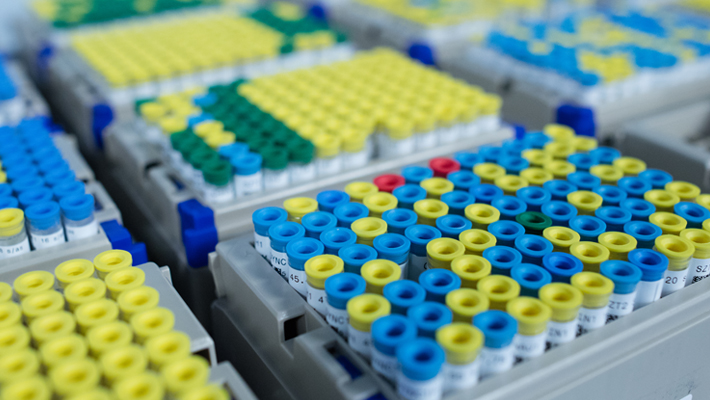
Hereditary diffuse gastric cancer (HDGC) is an inherited cancer syndrome caused by CDH1 gene mutations. It occurs most frequently in Japan and eastern Asia; current incidence in the U.S. is estimated at 10-40 individuals per 100,000.1
Individuals with mutations in the CDH1 gene have up to an 80% lifetime risk of diffuse gastric cancer (DGC) and up to a 60% lifetime risk of female invasive lobular breast cancer (ILC). As a result, they need increased medical screening and often consider prophylactic gastrectomy to reduce the risk of gastric cancer.
Why this matters:This study helps recognize the full spectrum of families that may benefit from CDH1 genetic testing.
Genetic testing for CDH1 mutations is recommended for those who meet the International Gastric Cancer Linkage Consortium (IGCLC) guidelines.1,2 Increasingly, patients have multi-gene panel testing (MGPT) to assess their hereditary cancer risk, which may include genes that are lower on the differential diagnosis. Unexpected CDH1 mutations may be found in patients who do not meet IGCLC criteria or do not have clinical characteristics suggestive of HDGC, and this poses a clinical challenge.
CDH1 Mutations Studied in Separate Groups
A new study aims to describe the clinical characteristics of CDH1 mutation carriers found through MGPT and offer informed recommendations for medical management.
Researchers at Ambry Genetics, University of Southern California (USC) and Stanford University collaborated to retrospectively review genetic test results from two groups:
- >26,000 laboratory probands who had MGPT with CDH1 (genes analyzed 5-43) at Ambry
- >300 clinic patients who had MGPT with CDH1 included in the panel (genes analyzed 5-110) at Ambry and three other testing laboratories
USC patients tested at Ambry were included in the USC counts, rather than the Ambry counts.
Key Study Results
CDH1 mutation-positive (CDH1+) cases were classified into three categories according to the 2015 IGCLC guidelines:
- IGCLC-positive
- IGCLC-partial phenotype
- IGCLC-negative
Overall, 20 pathogenic CDH1 mutations were identified. One individual in this group did not have cancer.
Those with cancer presented with:
- ILC (42%)
- Gastric cancer (21%)
- Invasive ductal breast cancer (IDC, 21%)
- IDC with lobular features (5%)
- Breast neoplasm, not other specified (5%)
- Colon cancer (5%)
Points for Your Practice
- 65% of cases reviewed did not meet the 2015 IGCLC criteria for consideration of genetic testing
- 3 CDH1 mutation carriers had gastric cancer, despite not meeting IGCLC criteria
- 21% of cases reviewed were found to have invasive ductal breast cancer, not the typical invasive lobular breast cancer associated with CDH1 mutations
- CDH1 mutations in this study may represent less penetrant mutations than those currently published and based on stringent HDGC guidelines
- So far, CDH1+ families seen at USC have been managed as classic HDGC families even if they did not meet IGCLC testing criteria
- This includes consideration of prophylactic gastrectomy between ages 20-30 and annual breast MRI beginning at age 301,2
USC Norris Comprehensive Cancer Center Director and lead author Stephen B. Gruber, MD, PhD, said, “CDH1 mutations continue to be the single most challenging clinical problem in cancer genetics, but this study sheds more light for informed decision making. Patients and families with CDH1 mutations will benefit from this study and this type of academic-industry partnership helps us address questions that can’t be answered in isolation.”
Unexpected CDH1 mutations are increasingly being found as the use of MGPT rises. This study found a significant number of individuals with CDH1 mutations having MGPT that did not meet the 2015 IGCLC criteria for consideration of genetic testing, consistent with a 2014 study of those without DGC or a family history of DGC undergoing MGPT.3
Current management guidelines and genetic testing criteria are based upon high penetrance CDH1+ families, but they may merit broadening in light of unexpected CDH1 mutations in an underlying population of families with reduced penetrance.
Until then, counseling and support balanced by consideration of risks, benefits and costs are integral to partnering with these patients in shared decision-making.
Read the research here.
References
- Kaurah P and Huntsman DG. Hereditary Diffuse Gastric Cancer. November 4, 2002 [Last update: July 31, 2014]. In: Pagon RA, et al., editors. GeneReviews® [Internet]. Seattle (WA): University of Washington, Seattle;1993-2017.
- Fitzgerald RC, et al. Hereditary diffuse gastric cancer: updated consensus guidelines for clinical management and directions for future research. J Med Genet. 2010 Jul;47(7):436-44.
- van der Post RS, et al. Hereditary diffuse gastric cancer: updated clinical guidelines with an emphasis on germline CDH1 mutation carriers. J Med Genet. 2015 Jun;52(6):361-74.
- Kurian AW, et al. Clinical evaluation of a multiple-gene sequencing panel for hereditary cancer risk assessment. J Clin Oncol. 2014 Jul 1;32(19)2001-9.



